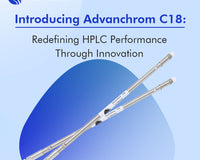Knowledge Base
-

The Critical Role of Chiral Separation and Its Modern Solutions
Chirality can mean the difference between medicine and catastrophe. In this article, we summarize the necessity of enantiomeric precision and explain how our Blossmate chiral columns offer flexible, MS-compatible solutions for analytical and preparative workflows, with chromatograms comparing our and competitor's column performances. -

Advancing Metabolic Therapeutics: An Overview of Retatrutide and the Analytical Rigor of Peptide Quantification
Retatrutide is a new synthetic peptide that facilitates weight loss through a dual-action mechanism. In this article, we utilize an Ultisil LP-C18 column for the determination of Retatrutide that achieves baseline separation with high resolution records. -
![[Readers Insight] The Interplay between Column Properties and Peak Integration](//www.welch-us.com/cdn/shop/articles/integration-1080-121_6a48d9b6-1313-4763-bd30-92e8074b75f8_535x.jpg?v=1768447339)
[Readers Insight] The Interplay between Column Properties and Peak Integration
In HPLC, the relationship between physical separation hardware and mathematical data processing is often overlooked. This article explores the inconspicuous but critical connection between column properties and the fidelity of peak area calculation, examining why theoretical constancy in integration often fails to align with empirical laboratory observations. -

LP Columns: More Than Just Tolerating Strong Acids
Ultisil LP columns from Welch Materials are designed for low-pH chromatographic conditions, yet their advantages are more than simply resistance to strong acids. Read this article to learn how these columns outperform in a unique way. -

High-Resolution SEC-HPLC Aggregation Analysis of a Pembrolizumab Biosimilar Using Welch Xtimate™ SEC Columns
This application note presents a robust SEC-HPLC method for high-resolution aggregation analysis of a Pembrolizumab biosimilar using Welch Xtimate™ SEC-300 columns. The method demonstrates excellent separation of monomer, HMW aggregates, and LMW fragments, supporting routine QC and biosimilar comparability studies. -
![[Readers Insight] Choose Methanol or Acetonitrile? The Organic Mobile Phase in HPLC](//www.welch-us.com/cdn/shop/articles/1080_746151f5-d530-4722-b64b-4cc9cff7a1d3_535x.jpg?v=1765506053)
[Readers Insight] Choose Methanol or Acetonitrile? The Organic Mobile Phase in HPLC
In HPLC analysis, methanol and acetonitrile are the most common organic mobile phases. But have you ever thought about what exactly differentiates them? When should methanol be used and when acetonitrile? In this article, the author shares their thoughts on this matter. -

Understanding HPLC Pumps (Part II): Practical Maintenance
In the second part of this article, we explain the composition of an HPLC pump and the terminologies behind, as well as practical troubleshooting and preventive maintenance methods and schedules to pump failures. -

Understanding HPLC Pumps (Part I): Common Misconceptions
In the first part of this article, we explain common misconceptions of HPLC pumps, from the number of pump channels (and why they don't equal the number of pump heads or modules) to the differences between high- and low-pressure systems, and parallel and serial pumps. -
![[Readers Insight] HPLC Column Selection: Core to Method Development (Part II)](//www.welch-us.com/cdn/shop/articles/1080-1105-2_b4aa3b37-ea3f-4e79-a57a-c6d3b30d6233_535x.jpg?v=1765505696)
[Readers Insight] HPLC Column Selection: Core to Method Development (Part II)
In this article, the author shares their answers for 8 common questions in column selection, aiming to guide users in choosing the most suitable column through practical experimentation. -
![[Readers Insight] HPLC Column Selection: Core to Method Development (Part I)](//www.welch-us.com/cdn/shop/articles/columnselection2-1080-1105_723f3401-a432-4f3b-af91-ea4881d85d16_535x.jpg?v=1765519204)
[Readers Insight] HPLC Column Selection: Core to Method Development (Part I)
A chromatographic column is the heart of separation. However, with thousands of column options on the market, it is often asked how to choose "the best one". In this article, the author explains the classifications of HPLC columns and how to select the most cmpatible column for an analyte. -
![[Readers Insight] Why Do Ghost Peaks Appear?](//www.welch-us.com/cdn/shop/articles/ghost-peak-1080-1029_535x.jpg?v=1761900878)
[Readers Insight] Why Do Ghost Peaks Appear?
In this article, we examine the common origins of ghost peaks in HPLC. From mobile phase contamination and instrument residues, to column impurities and sample-related degradation, the article explains how they contribute to the appearance of ghost peaks. -
![[Readers Insight] Is Retention Time Determined Solely by the Polarity of a Compound?](//www.welch-us.com/cdn/shop/articles/ret-time-1080-1027_bb36cb58-53c4-4db5-9d37-b70260ede6e8_535x.jpg?v=1765522193)
[Readers Insight] Is Retention Time Determined Solely by the Polarity of a Compound?
Have you ever thought about this question: In reversed-phase chromatography, does an earlier elution always mean the compound has higher polarity? Or rather — is retention time determined solely by the polarity of a compound? In this article, we explore what polarity is, why it acts as the primary factor affecting retention time, and what other factors are unneglectable.








![[Readers Insight] The Interplay between Column Properties and Peak Integration](http://www.welch-us.com/cdn/shop/articles/integration-1080-121_6a48d9b6-1313-4763-bd30-92e8074b75f8_535x.jpg?v=1768447339)


![[Readers Insight] Choose Methanol or Acetonitrile? The Organic Mobile Phase in HPLC](http://www.welch-us.com/cdn/shop/articles/1080_746151f5-d530-4722-b64b-4cc9cff7a1d3_535x.jpg?v=1765506053)


![[Readers Insight] HPLC Column Selection: Core to Method Development (Part II)](http://www.welch-us.com/cdn/shop/articles/1080-1105-2_b4aa3b37-ea3f-4e79-a57a-c6d3b30d6233_535x.jpg?v=1765505696)
![[Readers Insight] HPLC Column Selection: Core to Method Development (Part I)](http://www.welch-us.com/cdn/shop/articles/columnselection2-1080-1105_723f3401-a432-4f3b-af91-ea4881d85d16_535x.jpg?v=1765519204)
![[Readers Insight] Why Do Ghost Peaks Appear?](http://www.welch-us.com/cdn/shop/articles/ghost-peak-1080-1029_535x.jpg?v=1761900878)
![[Readers Insight] Is Retention Time Determined Solely by the Polarity of a Compound?](http://www.welch-us.com/cdn/shop/articles/ret-time-1080-1027_bb36cb58-53c4-4db5-9d37-b70260ede6e8_535x.jpg?v=1765522193)